The CJ Stone interview
Who is Chris Stone?
Perhaps you have never heard of Chris Stone? Now you know his name you are wondering well, what is so special about him, I expect, and what is this going to be about?
Chris, who is also often just known as "CJ", is a very good friend of mine and has been since the early 1970s. He is a journalist and author with several books to his credit and an impressive CV of publications that he has written for.
I thought I would interview him for so here is what I asked and Chris said in reply.

Author C.J. Stone interviewed for Wizzley
by BardofEly
C.J. Stone, or Christopher James Stone, to give him his full name is an author and journalist who has written for a number of well-known newspapers including The Guardian
CJ Stone and the Empire State Building
CJ goes to New York
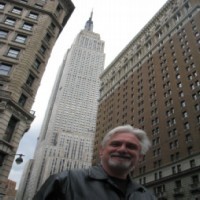 CJ Stone in America |
Buy books by CJ Stone
Fierce Dancing was CJ's first book on Faber and Faber
 | Fierce Dancing: Adventures in the Underground Faber & Faber Only $12.34 |
 | The Last of the Hippies Faber & Faber Only $15.0 |
Introduction to CJ Stone
In Whitstable
Please introduce and describe yourself.
Hi Steve. I’m 59 years old, born in the year of the coronation, 1953, a part-time writer and a part-time postman, living in Whitstable in Kent, where I have been these last 25 years. I can’t get away from the place.
What are some memorable moments in your career as a writer?
I started writing professionally in 1993. I’d always wanted to be a writer, and have several unfinished novels in a suitcase and notebooks stored in my Mum’s attic, but I was too self-critical and at the same time too ambitious to ever do anything with them. Then, sometime in 1992, I decided to limit my ambitions and to go for something more attainable. I was living on a council estate at the time and – having just read Charles Bukowski for the first time – decided I should write about the things I saw out of my window. Which is what did.
The first story was called Witch Way Out of Here, and the next, Still Life Behind Closed Curtains, both of which I sent off to the Guardian Weekend on the off-chance, having seen a story about council estate life in there. To my surprise they were accepted, and that was the beginning of my Housing Benefit Hill column, which ran for three years, from 1993 till 1996.
After that I had columns in the Big Issue, in Mixmag, and in the Independent. I also had two books published in this time, Fierce Dancing and The Last of the Hippies.
I think the greatest highlight was when I saw Fierce Dancing on the shelves of Waterstones in London for the first time. They were stacked up by the front entrance, a whole line of them, when I walked in. That was such a buzz and made me feel very proud, like I'd fulfilled my most sacred ambition at last.
Tips for other writers
Favourite authors
Do you have any tips you would like to share for other writers?
The best tip I can offer other writers is this: read your work aloud, either to yourself, or preferably to family and friends, before you attempt to publish. This is the one sure-fire way of assessing your work. As soon as it is being read you see it for what it is: you see all its faults. The best writing should sound like someone talking to you.
You are famous for your books Fierce Dancing and Last of the Hippies but what was it that got you involved in the hippy movement and the world of counter-culture to begin with?
I don’t know why I got involved in the hippy movement. It just seemed perfectly natural at the time. It was my era, Steve, just like it was yours. It was what we did. And we thought we were so new - didn’t we? – that there had never been anything like us on this planet before.
It’s taken a lifetime for me to find out that, actually, there were all sorts of movements before ours, and that we were merely the latest in a long line of counter cultural movements throughout history. The Romantics and the Surrealists, to name but two. That said, I don’t regret it. I’ve nailed my colours to that mast, as it were, and stood by those principles all my life.
Politically I‘m an anarchist, spiritually I’m a pagan. Both movements are characterised by the requirement for self-organisation and a rejection of authority. But I’m also a sceptic with healthy degree of wariness about other people’s claims and (I hope) with the ability to laugh at myself and to not take myself too seriously. As I’ve said: someone who can’t laugh at themselves can’t be taken seriously. I apply that to myself too.
Do you have any heroes or heroines and if so please list them and say why you consider them this way?
Heroes and heroines? I’ll talk about writers later. My heroes are all people who combine spirituality with political engagement. Obvious examples would be Ghandi and Martin Luther King.
I have a close affinity with the period of the English revolution, and there are several figures from this time who I admire: John Lilburne, Gerard Winstanley, Abiezer Coppe, to name three. More recently I’d say Tony Benn and Noam Chomsky, both of whom I have interviewed.
Musically I’d say Jerry Garcia, Leonard Cohen and Johnny Cash. Closer to home, I do admire my ex-wife Vanessa Winship, who is now an internationally renowned photographer and a model of someone who has never let go of her dreams, and who continues to work assiduously to attain her ideals.
What do think are the main reasons for trouble in the world today?
I think you and I probably disagree on this point. Is there a conspiracy? Of course there’s a conspiracy, I just don’t think it is quite as complex or as outlandish as you imagine it to be. It’s just the age-old conspiracy of the very wealthy to stay very wealthy, that’s all, and you don’t need Babylonian or Sumerian bloodlines or Reptilian invasions to show that it exists.
Actually it is the conspiracy of money, and almost unconscious in all of us since most of us have no idea what money actually is. As another of my sayings goes: “Money is the enemy in your pocket”, that is, money works upon us in ways that diminish our humanity and that serves the interests of the economic elites. It is a form of self-enslavement and the whole of the money-system needs a serious overhaul.
How do you see the future?
Personally I take an optimistic view of the future. Either the human race deserves its place on the planet, or it doesn’t. We are in severe crisis right now. We will never wipe the planet out as we once imagined. Such a thought is pure vanity. We can, however, wipe ourselves out. Either way, we get what we deserve.
The most any of us can do is to change the world in small ways. Or as Ghandi put it, “Be the change you want to see in the world.” You can’t do better than that. And as long as there are great human beings like Ghandi (or some of the others I’ve listed above) amongst us, then I think there is still hope.
Please mention some favourite authors and say why you like their books.
Favourite Authors? This has changed over time. In my early teens it was Ray Bradbury. Later, John Wyndham. In my 20s it was Frank Herbert, then Kurt Vonnegut. I still rate Vonnegut to this day, as a great free-thinker and a socialist, not to say, a fantastic writer.
Later again I read all of Dostoyevsky’s novels, and would rate Crime and Punishment as possibly the best novel ever written. I’ve been through all sorts of phases. These days I don’t read much fiction any more. I like the great historians EP Thompson, Christopher Hill and Eric Hobsbawm and I touch base with Noam Chomsky as often as I can.
But I think the writer I most admire, whose work affects me on an almost daily basis, is William Blake – more than just a writer: a poet, an artist, an engraver, spiritually mature, politically engaged, who managed to combine a visionary spiritual outlook with radical politics. As his great song says: “I shall not cease in mental fight, nor shall my sword sleep in my hand, till we have built Jerusalem in England’s green and pleasant land.” That is still my ideal.
What would you most like to achieve? What are your goals?
Goals? I still want to write a great book. I’m not sure if I’ve managed to achieve it yet. I’m working on it.
Copyright © 2012 Steve Andrews. All Rights Reserved.
The Trials of Arthur
Book by Christopher James Stone and Arthur Pendragon
 | The Trials of Arthur: Revised Edition Looks like a tramp. Says he's a King. Meet Arthur - Warrior, leader and Druid. An ex-squaddie and biker turned spiritual leader and parliamentary candidate. The bearer of the Sw... The Big Hand Books |
What others have said about CJ Stone
Quotes about CJ Stone
Stone writes with intelligence, wit and sensitivity." Times Literary Supplement
Publications *The Guardian Weekend*The Observer*The Big Issue*The Independent*The Independent on Sunday*The New Statesman*The London Review of Books*Mixmag*The Sunday Herald*The Times Literary Supplement*Prediction*Kindred Spirit*The Whitstable Times*Saga Magazine*Kent Life*The Whitstable Gazette*
Books *The Trials of Arthur (with Arthur Pendragon: Element Books 2003)*Housing Benefit Hill (AK Press 2001)*Last of the Hippies (Faber & Faber 1999)*Fierce Dancing (Faber & Faber 1996)*
"Wry, acute, and sometimes hellishly entertaining essays in squalor and rebellion." Herald
"The best guide to the Underground since Charon ferried dead souls across the Styx." Independent on Sunday
"Passionately serious, irresistibly compelling, and hilariously good-humoured." Professor Ronald Hutton, Bristol University
"Searching, funny, intelligent and illuminating." Deborah Orr, The Independent
Buy The Last of the Hippies by CJ Stone
 | Last of the Hippies Part autobiography, part history, part travelogue, this is an account of the author's experiences in that marginal realm, the mythical hippie's heavenly playground, and an inves... Faber & Faber Only $15.0 |
CJ Stone websites
Where to find out more about CJ Stone
You might also like
Welcome to the world of writer CJ StoneC.J. Stone is an author several books, as well as being a journalist and free...
In the Beginning - how I met King ArthurKing Arthur Pendragon is not just a Celtic character of myth and legend but i...
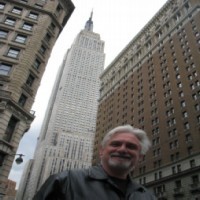

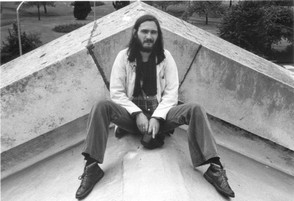

 What to see and do in Icod de los Vinoson 06/28/2016
What to see and do in Icod de los Vinoson 06/28/2016
 Herbs of the Sun, Moon and Planets is the follow up to Herbs of the Northern Shamanon 10/03/2015
Herbs of the Sun, Moon and Planets is the follow up to Herbs of the Northern Shamanon 10/03/2015
 Music for Pagan Weddingson 03/07/2013
Music for Pagan Weddingson 03/07/2013
 Los Silos is part of Tenerife’s Low Island or Isla Bajaon 02/23/2013
Los Silos is part of Tenerife’s Low Island or Isla Bajaon 02/23/2013

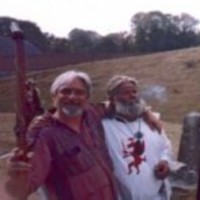
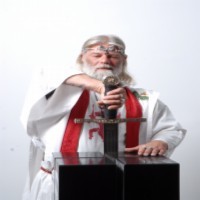
Comments
Thank you for reading and commenting!
Fascinating interview.